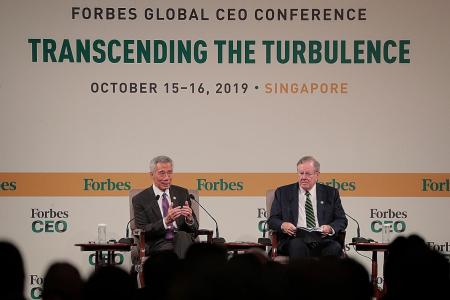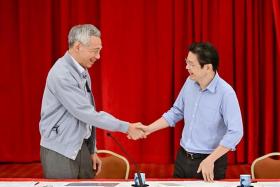Rocky situation in Hong Kong not good for Singapore, says PM Lee
He says 'wisdom and restraint on both sides' needed to deal with situation
Ongoing protests in Hong Kong may be disruptive for businesses there, but its companies have not made the move to Singapore - and this is not a situation Singapore hopes to see.
Rather, Singapore hopes the situation in Hong Kong will calm down so companies can conduct business there peacefully, Prime Minister Lee Hsien Loong said yesterday.
He was at the Forbes Global CEO Conference at the Shangri-La Hotel, where he was asked if Singapore has seen a trend of businesses moving over from Hong Kong.
During the dialogue, Forbes Media chairman and editor-in-chief Steve Forbes also asked PM Lee about the implications of the Hong Kong protests for Singapore.
"We thrive best in Singapore when the region is stable, when other countries are prospering and we can do business with them," said PM Lee.
He added he does not see any easy way forward for Hong Kong, as the demonstrators' demands "are not demands which are meant to be a programme to solve Hong Kong's problems", but "demands intended to humiliate and bring down the government".
Hong Kong's issues need to be progressively tackled, one of which is the one country, two systems policy, PM Lee said.
Referring to the approach needed to be taken, he said: "To put it very neatly, from China's point of view, they must not only think of one country but remember this is two systems; and from Hong Kong's point of view, you must not only think of two systems but remember that this is one country.
"And this calls for wisdom and restraint on both sides."
LAYER OF ANXIETY
Responding to another question from Mr Forbes on how US-China trade tensions are affecting Singapore, PM Lee said that the trade disputes have added an extra layer of uncertainty and anxiety to the global economy.
"It means that much less prosperity for the two countries, that much less buoyancy for the rest of the world, and that much fewer opportunities for our companies to invest in America and China and export to America, or to invest in America to do business with China," he said.
Most countries in Asia have China as their largest trading partner, including America's treaty allies like Japan, Australia and Thailand, he said, adding that they do not want to take sides between the two.
Rather, it is wiser to compete in a friendly manner and have a free trade agreement like the Trans-Pacific Partnership, which was renamed the Comprehensive and Progressive Agreement for Trans-Pacific Partnership (CPTPP) after Washington's withdrawal, he added.
The Chinese may be interested in joining the CPTPP one day, PM Lee noted, pointing out that this would be a win-win outcome for all, with China needing to adhere to more stringent rules, which are part of a modern free trade agreement.
Get The New Paper on your phone with the free TNP app. Download from the Apple App Store or Google Play Store now



